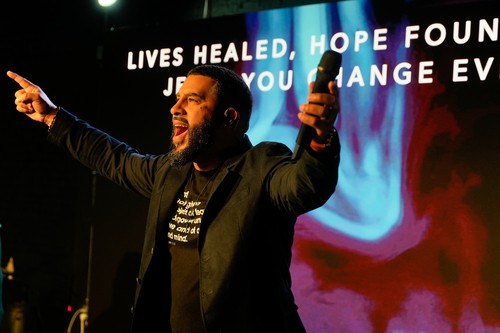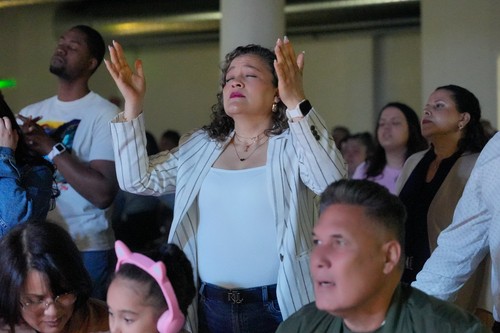April 7th, 2025
The Gospel of Mark: Who Do You Say I Am? (Mark 8-9)
In our journey of faith, we often encounter moments that challenge our perception of who Jesus truly is. It's easy to get caught up in the routines of religious life, attending services, and going through the motions without truly grappling with the profound question Jesus posed to His disciples: "Who do you say I am?"
This question isn't just a historical curiosity; it's a deeply personal inquiry that each of us must answer. Our response shapes not only our faith but our entire worldview and the way we live our lives.
This question isn't just a historical curiosity; it's a deeply personal inquiry that each of us must answer. Our response shapes not only our faith but our entire worldview and the way we live our lives.

The Gospel of Mark provides us with a powerful narrative that illuminates this question. Jesus takes His disciples to Caesarea Philippi, a location steeped in spiritual significance. In ancient times, mountaintops were seen as places to engage with the divine, where prophets would go to hear from God. By bringing His disciples to this high place, Jesus was inviting them to elevate their vision, to see beyond their everyday obstacles and glimpse something greater.
It's in this setting that Jesus asks, "Who do people say I am?" The disciples respond with various answers – John the Baptist, Elijah, one of the prophets. But then Jesus turns the question to them personally: "But what about you? Who do you say I am?"
Peter's response is pivotal: "You are the Messiah." This declaration goes beyond seeing Jesus as merely a teacher or a historical figure. It recognizes Him as the promised Savior, the one who would liberate and lead God's people.
It's in this setting that Jesus asks, "Who do people say I am?" The disciples respond with various answers – John the Baptist, Elijah, one of the prophets. But then Jesus turns the question to them personally: "But what about you? Who do you say I am?"
Peter's response is pivotal: "You are the Messiah." This declaration goes beyond seeing Jesus as merely a teacher or a historical figure. It recognizes Him as the promised Savior, the one who would liberate and lead God's people.

But Jesus doesn't stop there. He goes on to explain that His path as the Messiah involves suffering, rejection, and death. This revelation challenges the disciples' expectations and understanding. Jesus is showing them that being the Messiah means something far different – and far greater – than they had imagined.
The narrative then takes us to a mountaintop experience that would forever change how the disciples saw Jesus. On this high mountain, Jesus is transfigured before Peter, James, and John. His clothes become dazzling white, and Moses and Elijah appear, talking with Him.
This moment is more than just a spectacular display. It's a convergence of past, present, and future. Moses, representing the Law, and Elijah, representing the Prophets, are both present, but their attention is focused on Jesus. This scene demonstrates that Jesus isn't just another great figure in Israel's history – He's the fulfillment of both the Law and the Prophets.
The voice from the cloud declaring, "This is my Son, whom I love. Listen to him!" confirms Jesus' divine identity and authority. It's a moment that shatters any limited understanding of who Jesus is and reveals Him as the eternal Son of God, transcending time and space.
The narrative then takes us to a mountaintop experience that would forever change how the disciples saw Jesus. On this high mountain, Jesus is transfigured before Peter, James, and John. His clothes become dazzling white, and Moses and Elijah appear, talking with Him.
This moment is more than just a spectacular display. It's a convergence of past, present, and future. Moses, representing the Law, and Elijah, representing the Prophets, are both present, but their attention is focused on Jesus. This scene demonstrates that Jesus isn't just another great figure in Israel's history – He's the fulfillment of both the Law and the Prophets.
The voice from the cloud declaring, "This is my Son, whom I love. Listen to him!" confirms Jesus' divine identity and authority. It's a moment that shatters any limited understanding of who Jesus is and reveals Him as the eternal Son of God, transcending time and space.

This transfiguration experience challenges us to reconsider our own vision of Jesus. Do we see Him merely as a good teacher, a moral example, or a historical figure? Or do we recognize Him as the Lord of all creation, the one who commands time and space, who brings the past and future into the present moment?
The implications of truly seeing Jesus for who He is are profound. If Jesus is who He claims to be – the Son of God, the Messiah, the Lord of all – then our response can't be casual or halfhearted. It demands a total reorientation of our lives.
Jesus makes this clear when He says, "Whoever wants to be my disciple must deny themselves and take up their cross and follow me." This isn't a call to mere religious observance; it's an invitation to a life of radical discipleship. It means being willing to lay down our own desires, ambitions, and even our very lives for the sake of following Jesus.
This call to discipleship isn't easy. Jesus doesn't promise a life free from difficulties or suffering. In fact, He explicitly warns that following Him will involve challenges and sacrifices. But He also promises something far greater – the salvation of our souls, a life of purpose and meaning that transcends the temporary pleasures and pursuits of this world.
As we reflect on this, we're confronted with the same question Jesus posed to His disciples: "Who do you say I am?" Our answer to this question isn't just a matter of intellectual assent or religious tradition. It's a declaration that should shape every aspect of our lives.
If we truly believe that Jesus is the Messiah, the Son of God, then we can't remain unchanged. We're called to a life of transformation, where we continually seek to align our will with His, where we're willing to take up our cross daily and follow Him.
This journey of discipleship isn't one we walk alone. Just as Jesus revealed His glory to Peter, James, and John on the mountaintop, He promises to reveal Himself to us as we follow Him. He invites us into a relationship where we can experience His presence, His power, and His love in tangible ways.
The transfiguration reminds us that Jesus is not bound by our limited understanding or expectations. He is the Lord of all creation, the one who holds all things together. When we truly grasp this reality, it changes how we approach every aspect of our lives – our relationships, our work, our struggles, and our joys.
The implications of truly seeing Jesus for who He is are profound. If Jesus is who He claims to be – the Son of God, the Messiah, the Lord of all – then our response can't be casual or halfhearted. It demands a total reorientation of our lives.
Jesus makes this clear when He says, "Whoever wants to be my disciple must deny themselves and take up their cross and follow me." This isn't a call to mere religious observance; it's an invitation to a life of radical discipleship. It means being willing to lay down our own desires, ambitions, and even our very lives for the sake of following Jesus.
This call to discipleship isn't easy. Jesus doesn't promise a life free from difficulties or suffering. In fact, He explicitly warns that following Him will involve challenges and sacrifices. But He also promises something far greater – the salvation of our souls, a life of purpose and meaning that transcends the temporary pleasures and pursuits of this world.
As we reflect on this, we're confronted with the same question Jesus posed to His disciples: "Who do you say I am?" Our answer to this question isn't just a matter of intellectual assent or religious tradition. It's a declaration that should shape every aspect of our lives.
If we truly believe that Jesus is the Messiah, the Son of God, then we can't remain unchanged. We're called to a life of transformation, where we continually seek to align our will with His, where we're willing to take up our cross daily and follow Him.
This journey of discipleship isn't one we walk alone. Just as Jesus revealed His glory to Peter, James, and John on the mountaintop, He promises to reveal Himself to us as we follow Him. He invites us into a relationship where we can experience His presence, His power, and His love in tangible ways.
The transfiguration reminds us that Jesus is not bound by our limited understanding or expectations. He is the Lord of all creation, the one who holds all things together. When we truly grasp this reality, it changes how we approach every aspect of our lives – our relationships, our work, our struggles, and our joys.

As we go about our daily lives, may we continually wrestle with the question, "Who do you say I am?" May we have the courage to declare, like Peter, "You are the Messiah," and may that declaration lead us into a life of radical discipleship, where we experience the transforming power of Christ in ever-deepening ways.
Let us lift our eyes above our everyday obstacles and catch a glimpse of Jesus in all His glory. May we be willing to lay down our lives, take up our cross, and follow Him wherever He leads. For in losing our lives for His sake, we find true life – life abundant and eternal.
Who do you say Jesus is? Your answer to this question has the power to change everything. May we have the courage to answer truthfully, and may that answer lead us into a life of adventure, purpose, and deep communion with the King of Kings and Lord of Lords.
Let us lift our eyes above our everyday obstacles and catch a glimpse of Jesus in all His glory. May we be willing to lay down our lives, take up our cross, and follow Him wherever He leads. For in losing our lives for His sake, we find true life – life abundant and eternal.
Who do you say Jesus is? Your answer to this question has the power to change everything. May we have the courage to answer truthfully, and may that answer lead us into a life of adventure, purpose, and deep communion with the King of Kings and Lord of Lords.
Want to Go Deeper?
If this sermon spoke to you and you’re ready to explore it further, this study guide is for you! Inside, you’ll find key Scriptures, reflection questions, and practical applications to help you grow in your faith. Open it up, dig in, and let God’s Word transform your life!
PREVIOUS SERMONS...
"The House Of..." | LENT | Pastor JohnEric Zayas
Mar 1, 2026 • Pastor JohnEric Zayas
I Am A Child Of God pt.6 | Pastor John Zayas
Feb 22, 2026 • Pastor John Zayas
A Child of God pt. 5 | Pastor John Zayas
Feb 15, 2026 • Pastor John Zayas
Midweek
Feb 11, 2026
Midweek
Feb 11, 2026
I AM A CHILD OF GOD pt. 4 | Pastor JohnEric Zayas
Feb 8, 2026 • Pastor JohnEric Zayas
View More

No Comments